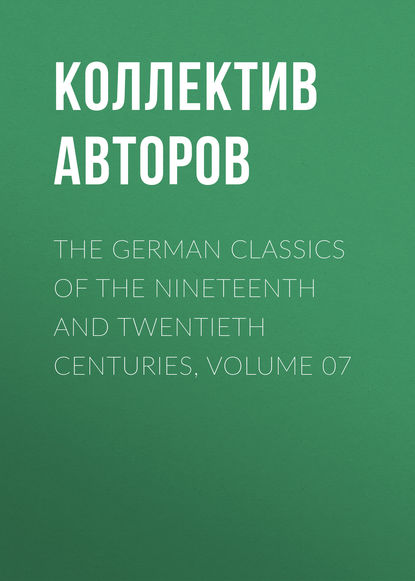По всем вопросам обращайтесь на: info@litportal.ru
(©) 2003-2024.
✖
The German Classics of the Nineteenth and Twentieth Centuries, Volume 07
Настройки чтения
Размер шрифта
Высота строк
Поля
SONNSFELD (comes out angrily, speaks when the noise has subsided).
This is unendurable! It is enough to ruin one's nerves—left wheel—march—out with you to the parade ground where you be long! [The drummers march out still playing. When the noise can no longer be heard she continues.] Eversmann, you ought to be ashamed of yourself. You should remind the King of the respect due to ladies.
EVERSMANN
I obey my royal master's orders, ma'am. And inasmuch as late rising is a favorite vice of the youth of today, it has been ordered that the reveille be played at six o'clock every morning before the doors of the royal Princes and Princesses.
SONNSFELD
Princess Wilhelmine is no longer a child.
EVERSMANN
Her morning dreams are all the sweeter for that reason.
SONNSFELD
Dreams of our final release—of despair—of death—
EVERSMANN
Or possibly dreams of marriage—and the like—
SONNSFELD
Have a care, Eversmann! The Crown Prince has won his freedom at last; he is keeping a most exact record of all that happens in Berlin and in the immediate environment of his severe father. It is well known that you influence the King more than do his ministers.
EVERSMANN
If the poetic fancy of our Crown Prince, who, by the way, is my devoted young friend Fritz, cannot see the truth more clearly than that, then I have little respect for the imaginative power of poets. I—and influence? I twist His Majesty's stately pigtail every morning, clip his fine manly beard, fill his cozy little Dutch pipe for him each evening—and if in the course of these innocent employments His Most Sacred Majesty lets fall a hint, a remark—a little command possibly—why—naturally—
SONNSFELD
You pick them up and weave them into a "nice innocent little influence" for yourself. Eh? An influence that has already earned you three city houses, five estates, and a carriage-and-four. Have a care that the Crown Prince does not auction off all these objects under the gallows-tree some fine day.
EVERSMANN
Oh, but your Ladyship must have slept badly. Pray spare me these—predictions and prophesyings, which are made up of whole cloth. His Royal Highness the Crown Prince is far too much, of a philosopher to take such revenge on a man who has no more dealings with His Majesty than to fill his pipe each evening, to braid his pigtail each morning, and to shave him in the good old German fashion every second day. Have I made my meaning clear?
[He goes out.]
SONNSFELD
Go your way, you old sinner! You may pretend to be ever so honest and simple—we know you and your like. Oh, what a life we lead here in this Court! Cannons thunder in the garden under our windows every morning or else they send up a company of soldiers to accustom us to early rising. After the morning prayer the Princess knits, sews, presses her linen, studies her catechism, and, alas! is forced to listen to a stupid sermon every day. At dinner, we get very little to eat; then the King takes his afternoon nap. He's forever quarreling with the Queen, they have scarcely a good word to say to each other, and yet the entire family are expected to look on at His Majesty's melodious snore-concert, and even to brush away the flies from the face of the sleeping Father of his country. If my Princess did not possess so much natural wit and spirit, the sweet creature would be quite crushed by such a life. If the King only knew that she is learning French secretly, and can almost write a polite little note already—! I hear her coming.
SCENE II
PRINCESS WILHELMINE comes in, carrying a letter.
WILHELMINE (timidly).
Can any one hear us?
SONNSFELD
Not unless the walls have ears. Is the letter written?
WILHELMINE
I hardly dare send it, dear Sonnsfeld. I know there are a hundred mistakes in it.
SONNSFELD
A hundred? Then the letter must be much longer than Your Highness first planned it.
WILHELMINE
I wrote that I fully appreciate the value of the services offered me, but that my position forces me to refuse any aid to my education which cannot be attained at least by the help of my mother, the Queen.
SONNSFELD
Is that what you have written? And made a hundred mistakes? In that case we are just where we were before. I appreciate that an eighteen-year-old Princess has to consider history, posterity and so forth—but this conscientiousness will be your ruin. The King will continue to make a slave of you, the Queen to treat you as a child. You are the victim of the conflict between two characters who both perhaps desire what is best for you, but who are so totally different that you will never know whom or which one to please. The Crown Prince has made himself free—and how did he do it? Only by courage and independence. He tore himself loose from the oppressive bondage imposed on him by the caprice of others, and won the means to complete his education. And now he sends to you from Rheinsberg his friend, the Prince Hereditary of Baireuth, to be a support and protection to you and to the Queen—so that here in this Court where they drum, trumpet, and parade all day long, you may not finally, in your despair, seize a musket yourself and join the Potsdam Guards!
WILHELMINE
You have a sense of humor, my dear Sonnsfeld. It is all well enough for my brother to make plans and send out emissaries, when he is safe in Rheinsberg. He knows that the path to the freedom he has won led past the very foot of the scaffold. I am of the sex whose duty it is to be patient. My father is so good at heart, gentler possibly, in his true self, than is my mother. She indeed, absorbed in her political ambitions, often turns from me with a harshness that accords ill with mother-love. It is my fate to endure this life. Ask yourself, dear friend, how could I trust to a chance adventurous stranger whom my brother sends to me from out of his wild, artistic circle in Rheinsberg—sends to me to be my knight and paladin? Such a thought could have been conceived only in the brains of that group of poets. I'll confess to you in secret that I should greatly enjoy being in the midst of the Rheinsberg merriment, disguised of course. But I'm in Berlin—not in Rheinsberg, and so I have gathered up my meagre scraps of French and thanked the Prince of Baireuth for his offer in a manner which is far more a refusal than an acceptance.
[Hands SONNSFELD the letter.]
SONNSFELD
And I am to dispatch this letter? [With droll pathos.] No, Your Highness, I cannot have anything to do with this forbidden correspondence.
WILHELMINE
No joking please, Sonnsfeld. It was the only answer I could possibly send to the Prince's tender epistle.
SONNSFELD
Impossible!—To become an accomplice to a forbidden correspondence in this Court might cost one's life.
WILHELMINE
You will make me angry!—here, dispatch this letter, and quickly.
SONNSFELD
No, Princess. But I know a better means, an absolutely sure means of dispatching the letter to its destination, and that is—[She glances toward a door in the background] deliver it yourself.

















